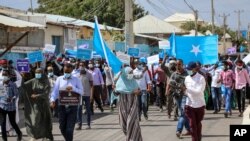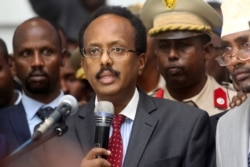The federal government of Somalia has called on diplomats in the country not to interfere in the country’s internal political affairs.
The notice by Information Minister Osman Dube came after representatives of various entities, including the United States, the European Union and the U.N. office in Somalia, said they would not support a possible partial term extension for Somalia’s current president.
Dubbe said his government expected its international partners to respect Somalia's sovereignty and territorial integrity within the principles of international law. He added that it’s illegal to intervene in a sovereign state's internal issues, calling it a red line that must never be crossed.
The government of President Mohamed Abdullahi Mohamed, popularly known as Farmajo, is facing international pressure to conduct elections.
Disputes over the electoral process have held up the polls, and talks among political stakeholders to end the standoff have yet to bear fruit.
Meanwhile, the president’s term officially expired last month, and opposition groups have said he no longer has a mandate to run the government.
Political analyst Mohamed Muse Aden said the strong comments from the international community were expected because Farmajo’s administration failed to utilize its mandate during its term in office to plan for transparent polls.
“Actually, the role of the international community for pressuring the Somali actors in conducting the elections is very crucial, especially in this period where the electoral impasse creates uncertainties for the Somali people," Aden said. "Although historically, they used to play similar roles in helping the stakeholders to come together and chart out peaceful and inclusive electoral processes, but this time round, their influence and presence is more critical.”
Mohamed Matan, a senior lecturer of international relations at the University of Somalia, said the international community has invested in Somalia’s recovery and has a say when things are not going in the right direction.
Matan said international relations are based on economy, security and law, and that therefore it's not right for Somalia, through the minister, to warn against interference. He added that in his opinion, the diplomats' comments about delayed elections were not against sovereignty of the nation, but were for the norms of international law.
Meanwhile, U.N. envoy James Swan has held meetings with Somali state leaders in the past week to iron out differences.





